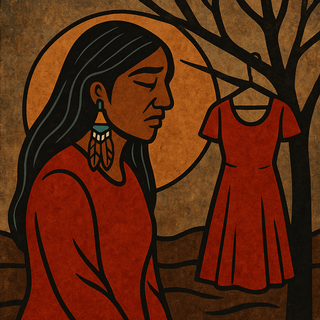At Cheekbone Beauty, May 5th—Red Dress Day—is not just a date on the calendar. It’s a day of remembrance, truth-telling, and action. It’s a day to honour the thousands of Missing and Murdered Indigenous Women, Girls, and Two-Spirit people (MMIWG2S) whose lives were taken, erased, or forgotten by systems built on colonial violence. And it’s a day to say: never again.
This year, we are donating $5 from every Resilience Red Lip Oil sold to the Urban Indigenous Collective, a vital organization that provides culturally safe, community-based wellness for Indigenous people living in urban environments. Their work supports the healing and health of our people, especially our women and Two-Spirit relatives.
The Long Shadow of Colonialism
The violence Indigenous women face today isn’t new. It is rooted in centuries of colonial policy and systemic erasure:
-
Violence and Exploitation: From the moment European settlers arrived, Indigenous women were targeted with sexual violence used as a tool of conquest and control.
-
Displacement and Family Destruction: Policies like the Indian Act (Canada) and Indian Removal Act (U.S.) fractured families and communities, stripping women of their traditional leadership roles and displacing them from their homelands.
-
Residential and Boarding Schools: These state- and church-run institutions tore children away from their families. Many Indigenous girls were exposed to physical, emotional, and sexual abuse—experiences that still reverberate in families today.
-
Loss of Legal Identity: Until 1985 in Canada, Indigenous women who married non-Indigenous men lost their legal “Indian status,” severing them from their rights, their communities, and often their children.
The Ongoing Crisis
This violence continues in the present:
-
Systemic Discrimination: Indigenous women are overrepresented in homelessness, incarceration, and poverty—while being underrepresented in healthcare and education systems built without them.
-
MMIWG2S Crisis: Thousands of Indigenous women and girls have gone missing or been murdered in Canada and the U.S.—often without proper investigation, media attention, or justice. In 2019, Canada’s National Inquiry named this violence for what it is: a genocide.
-
Sterilization Without Consent: Into the late 20th century, Indigenous women were subjected to forced sterilization across both countries—part of a eugenics movement aimed at erasing Indigenous people.
Our Women Were the Backbone of Survival
As Tanya Talaga writes in her newest book, The Knowing, the treatment of Indigenous women has been “grim.” And yet, without Indigenous women, colonizers would not have survived Turtle Island’s harsh winters, vast landscapes, or unfamiliar foods. Indigenous women were the caretakers, the healers, the translators, the protectors of knowledge. Their names are often missing from history books—but they were behind many of the so-called "great explorers" of this land.
The fact that Indigenous women have been both essential and expendable in the eyes of colonial systems is a tragedy we must confront.
But We Are Still Here
Despite everything, Indigenous women continue to lead, create, build, and protect. We are reclaiming our languages, revitalizing ceremony, growing businesses, defending land and water, and raising generations of powerful changemakers. We are lawyers, artists, aunties, mothers, and matriarchs. We are not victims—we are visionaries.
What You Can Do
This Red Dress Day, we invite you to:
-
Wear red to honour those we’ve lost.
-
Hang a red dress in your window or community.
-
Educate yourself about the MMIWG2S crisis and colonial history.
-
Support Indigenous-led organizations like the Urban Indigenous Collective.
-
And if you’re able, purchase a Red Lip Oil—$5 from every sale will directly support healing work for Indigenous people.
We all carry someone who is missing. Some of us carry many.
We remember.
— Cheekbone Beauty


